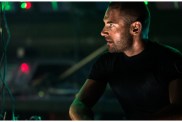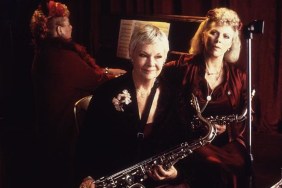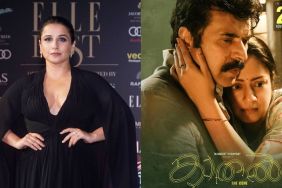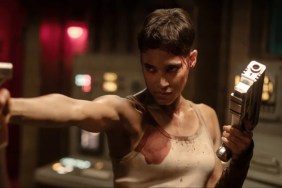The director of Pitch Black returns with a new thriller

It’s been five years since David Twohy directed Vin Diesel in The Chronicles of Riddick, the sequel to the sci-fi thriller Pitch Black that was somewhat of a shocking departure from the dark stylish horror that found Twohy such a large fanbase, being more of a big budget sci-fi action adventure with huge sets that somehow felt like it was overreaching.
Now, Twohy is back with A Perfect Getaway, a tension-filled thriller that follows a newlywed couple, played by Steve Zahn and Milla Jovovich, on their honeymoon in Hawaii who start hearing stories about brutal murders on a neighboring island and start suspecting two other couples they keep encountering on their travels, including a pair of survivalists played by Timothy Olyphant (Deadwood) and Kiele Sanchez (Lost). It’s a fun character-based story that takes full advantage of the island surroundings to keep the viewer guessing who might be the killer and what might happen next.
ShockTillYouDrop.com had a chance to sit down with Twohy for an exclusive interview, and we quickly learned that Two is not only super-smart but he’s also the epitome of Hollywood cool when it comes to screenwriters â he reminded us of Mamet in that sense â making this a true two-way interaction rather than just another typical filmmaker Q ‘n’ A.
ShockTillYouDrop.com: This movie is surprising because I think we’re used to you doing dark movies that take place in secluded spaces, but this mostly takes place outdoors in the daytime.
David Twohy: The cinematography is that, but the tone of the piece is not that.
Shock: True, but even the thought of spending 90 minutes in this bright and sunny setting with David Twohy just seems like such an odd idea.
Twohy: That’s why I did it, but also the tone of the movie is dark. About half way through the movie, it turns pretty twisted, so I don’t think it’ll be disappointing the fan base.
Shock: I think people who aren’t familiar with your work might go, “Oh, it’s this nice vacation movie.” I was going to ask this later in the interview, but how involved are you in the marketing of your movies? The trailers for this one really do a good job selling it, they’re great.
Twohy: Are they? Do you like them? Well, it’s Universal. Same marketing team I did Pitch Black with, same marketing team I did Riddick with. Even though it’s a Rogue release and Relativity financed it, they output it through Universal and you get that same team. They’re some of the best in the business and I’m largely happy with it. You take a meeting or two, you understand what their game plan is and then you say, “Okay, you’re the pros. Go for it.” So I don’t micromanage it even though I do see the TV spots and I will say something like â as a matter of fact, I said something like this last night. We have a new round of TV spots coming and one spot tipped its hand too much.
Shock: Right, I think someone told me there was a commercial that might give too much away.
Twohy: Yeah, but this spot hasn’t even run yet so I asked them for some changes in that. I’ll weigh in on which TV spots work and I have veto power where ones that suck. So I just tell them, “This one sucks, get rid of it. ” That’s how I deal with it.

Shock: As you probably know, this is a very difficult film to talk about because you can talk about the general plot of three couples meeting on vacation, but you can’t get too far into what happens after that, which I’m sure you must have realized while writing it.
Twohy: Well, that’s your curse, so you figure out how to write about it without doing that. My curse is how to make it surprising when I’m doing the movie and then in marketing, how do you make it look exciting and intriguing without giving away it’s surprises? So that’s my curse and you got your own, how much to share and at what point to share it.
Shock: The film seems to explore the theme that “looks can be deceiving.” We have a couple on a honeymoon who meet two other couples, who may or may not be serial killers, and we go back and forth as they try to figure out which one. Was that theme something you wanted to explore when you started writing this?
Twohy: It was that thought about when you’re going on vacation we wind up talking to strangers, telling them all kinds of stuff that we probably shouldn’t. [laughs] Sometimes we open up more to strangers than people we know. Milla has that line in the movie. I think A Perfect Getaway was sort of a reaction and maybe an overreaction to big-scale filmmaking. After Riddick, I wanted to do something modest, something small, something like Blood Simple maybe something like The Usual Suspects that relied more on interesting characters and turns of the plot rather than high concept or big-budget movie making. I found myself on vacation in Hawaii and I remember having that thought about sometimes we share more with strangers than with people we know, sometimes we share more on vacation than we otherwise would.
Shock: And sometimes you just make stuff up to make your life seem more glamorous.
Twohy: [laughs] Right, you reinvent yourself, yes. I thought about that impulse and while I was hiking the Kalalau Trail, I started thinking about that impulse and how it could be dangerous. Then I started just to pass the time trying to create back stories for all the trekkers that I would see and meet on the trail, “Okay, he’s an ex-military guy and he’s the manager of the restaurant [who] hired her as a hostess.” Just creating these little back stories for people…and maybe they’re serial killers. Then that lead me to the thought that maybe I could do a movie about personalities sharing too much, meeting the wrong people in this isolated environment, that very trail there that I happened to be on. When I got back to the hotel I started writing what turned out to be A Perfect Getaway.
Shock: Did the movie have a different title at one point?
Twohy: Nope.
Shock: So it was always A Perfect Getaway, which is basically a play on words of escaping on a vacation vs. escaping from someone potentially dangerous.
Twohy: A double entendre.
Shock: Right. I wanted to ask about the self-awareness of this movie. It is very self aware.
Twohy: Self-referential? Well, he’s a screenwriter or says he is.
Shock: Right, but you’re watching this thriller where you expect certain things to happen and then the characters start talking about those things, which is not something we normally see.
Twohy: Nic Cage.
Shock: Yeah, like talking about Nic Cage, exactly. Could you talk about why you wanted to explore that in this movie as well?
Twohy: Well, this is not a movie that respects a three-act structure and conventional things like that. It’s written free-form and that’s what I set off to do, so the idea that the characters poke fun at that, too, and the idea that the red herring in the script might start talking about red herrings, I just found that kind of delightful. I think that people who are in the business will like it on a certain level that other people who are not in the business probably won’t even really pick up on. But I don’t know, I just wanted to have fun with it.
Shock: It definitely adds something fun, because you start hearing the characters talking about plot devices and twists and you start wondering, “Are they allowed to do that in a movie”?
Twohy: Well, it’s like you’re not gonna make movies about people who never go to see movies and movies don’t exist, or you work in a universe where they have seen Harry Potter and they have seen Nic Cage in all these movies.
Shock: Before, you said this is a smaller scale movie and you ended up going to Puerto Rico to shoot for Hawaii. What was involved with finding all of these outdoor locations and getting your cast and crew there?
Twohy: Well, my initial concept was to film it on the Kalalau Trail with just a minimal guerilla crew. I thought we’d be sleeping in tents, waking up the next morning just rolling out and starting to film, actors would be doing their own makeup. That’s how low budget I thought I was going to go and I was willing to go, but somehow, you never quite can do that. The crews always starts building, getting bigger, you start talking to technical guys, they need their supply lines in and out every day, food in and out every day. (Laughs) Quickly, the size and the scope of the production grew larger than I’d anticipated and then financially we had to go to Puerto Rico instead of Kaua’i because there was only a 15 percent rebate in Kaua’I and 40 percent in Puerto Rico, so suddenly we found ourselves there. Still, any movie like this where it’s 95 percent exterior – whereas “Riddick” was 100 percent interior – that was also the reaction to that movie too. It was like, “Let me do something else this time and I’ll go outside.” Then when you want rain you get sun and when you want sun you get rain. [laughs] But you should definitely keep rolling with those damn punches. The same thing happened to me on Pitch Black. I got hammered with the weather in the Australian outback because in Pitch Black I was trying to do this arid world, no rain, had to be desolated. In the middle of nowhere. I liked that a lot, but we just got rained out all the time on Pitch Black. I was like, “F*ck.” But yeah, being exposed to the elements is hell on a crew because you’ll get rain when you want sun and vice versa, but there’s something kinda magical about it too.
Shock: I was curious because Below and Pitch Black were generally studio movies but they were small scale compared to Riddick. I was curious, where do you go from Riddick, can you go back to doing a small movie again?

Twohy: Yeah, you go back small again. Pitch Black wasn’t really a studio movie. Pitch Black was an independent movie that almost went straight to video, but then I think it was Harry Knowles that saw it and liked it and started writing about it and that’s when Universal looked at it again and said, “Maybe we can make some money with this.”
Shock: There’s been a lot of talk with Vin over the years of doing more Riddick. It’s kind of up to the two of you to decide if you want to do it I guess.
Twohy: It is.
Shock: Are you going to go back to how you did the first one and do it more independently?
Twohy: Very much so. I’ve sketched out two ideas for the next installment. Vin and I have decided on one approach of those two. There’s some interest at the studio level and it would be at a PG-13 level and we don’t want to do that anymore. That’s one of the concessions we made with Riddick that we shouldn’t have made. We also spent too much money and were too ambitious. So yes, if we do go back to a third one it will be focused, hopefully the same way Pitch Black was and we’ll spend less money doing it. We’re just trying to figure out how much less we can do it for ’cause I don’t think Vin is gonna work for scale again. [laughs]
Shock: Right, would it take place after the last movie or in between the first and second?
Twohy: It would take place after the movie.
Shock: What else have you been doing? Have you been writing other scripts?
Twohy: Yeah, I’ll write scripts for other people. I bank two to three scripts, maybe even three or four scripts in between movies so that hopefully the goal is to set up the next one while you’re shooting. It never really happens, but I’m just writing. I’ve been writing for other people, sometimes rewrites for studios and things like that.
Shock: Do you have another movie you want to direct next or are you waiting to see what happens with Riddick first?
Twohy: Well, “Riddick” is a possibility, we’re looking at the possibility of selling that one territory by territory, see what that adds up to and then can we do this story that we have in mind for that amount of money. So that’s what we’re examining right now and it may or may not happen. But, there’s also another project that I’m excited about called Crying Havoc, a script of mine. Ridley Scott will produce and it is about an FBI agent who uses technology to track a spy around the world only to learn that that spy is more demon than human and that demon leads him into the lower circles of hell, psychologically speaking. So, that’s a cool one.
Shock: It sounds great, and it returns to some of your darker fantasy genre elements.
Twohy: It does and hopefully it has some of the same sort of visual prowess of a movie like Constantine, but hopefully a more coherent script. So, that’s in the works too. That may be next.
Shock: Have you ever been approached to direct an existing franchise? I’m a big fan of the visuals you’ve done so I was curious whether someone ever wanted you to bring that vision to their franchise.
Twohy: Yeah, I get a lot of number threes for some reason as a matter of fact. My response is, “If I’m going to do a number three it probably should be my own franchise, not somebody else’s franchise. If I’m a writer, director I should be doing something that’s more original than just shooting somebody else’s series.” So, I do get âem, but it feels like that’s gonna be a sell-out and it feels like I should be creating more original material. My agent doesn’t always like that answer, but that’s the answer I give him.
Shock: Of course, because he wants you to keep working and directing a movie every one or two years. My editor wanted me to find out whether the new Riddick might return to being more of a creature feature like Pitch Black.
Twohy: Well, it will always be Riddick-centric. Is the question will it be more like the first one than the second one?
Shock: I guess he was asking whether the next movie would be more based around the creatures like the first movie.

Twohy: Well, it was and it wasn’t. Yeah, you could sell it on its creatures and say, “This is a creature fest and we’re gonna go out and disperse the creatures,” but that’s like a lot of different movies. However, the hallmark of a good movie, and I think Pitch Black is a good movie is that even if you took the creatures out of the picture you still have some pretty interesting character dynamics going on within that group and it’s almost like you can tell the same stories without the creatures or substitute some other type of external pressure on the group because there were internal pressures as well which were interesting. So, was it really a creature feature? Well, it had the hallmarks of it, it had the trappings of a creature movie, but it also had pretty good characters. So, the third movie would be much more modestly scaled and it would feel probably more like Pitch Black than Chronicles.
Shock: What do you enjoy watching when you’re not making movies or writing? Do you tend to like genre movies? If you had to watch a movie right now, what would it be? A movie you’d seen before?
Twohy: Probably The Hurt Locker.
Shock: Have you seen it yet?
Twohy: No, I haven’t seen it yet. I want to catch up to it. I’m pretty egalitarian in all the movies I see and as a member of the Academy, they send all of the worthy ones to your place of residence where you have to watch them before you vote. So you get them all on DVD and I plowed through them all and I try to be democratic and see everything. Yeah, I will go see genre films, but I’ll tell ya, I like documentaries too. I find myself watching the Discovery Channel a sh*t load and the reality-based stuff to me and the cool documentaries.
Shock: I hope you like The Hurt Locker, it’s such a good movie. I’ve seen it about four times now.
Twohy: Seriously? Is it always the same?
Shock: The characters and their situations are so strong you really find something different to get out of it with each viewing.
Twohy: What did she make it for, do you know?
Shock: I’m not sure, but probably not more than $10 million I’d guess.
Twohy: Do you know where they shot?
Shock: They shot in Jordan.
Twohy: Alright, based on your recommendation I’m going to go see The Hurt Locker.
A Perfect Getaway opens on Friday, August 7. Look for our interviews with Twohy’s stars Milla Jovovich and Timothy Olyphant later this week.




Source: Edward Douglas









